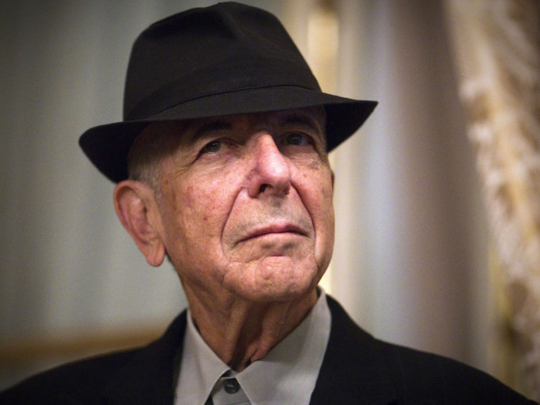
Releasing a new album near his 80th birthday, Leonard Cohen cheekily addresses his age in the very first song, intoning, “It’s not because I’m old ... I always liked it slow.”
The legendary poet and songwriter nonetheless glides confidently through a gamut of themes and styles on the album Popular Problems, ruminating in his husky and undiminished voice on war, loss and his own spiritual odyssey.
The Canadian-born talent turns 80 on Sunday, two days before the release of Popular Problems. But Cohen said that the timing of his 13th studio album — his first since 2012 that comes decades after classic songs such as Hallelujah and So Long, Marianne — was coincidental.
On the latest album, Cohen invokes Hurricane Katrina in Samson in New Orleans, lamenting the destruction of jazz’s birthplace: “You said you loved her secrets / And her freedoms hid away / She was better than America / That’s what I heard you say.”
In one of the more striking musical passages, Cohen brings in plaintive Arabic snippets of a female singer in Nevermind, in which he bemoans the anonymity of war victims with verses such as, “The story’s told with facts and lies / I had a name / But never mind.”
Cohen, previewing the album at a New York nightclub, said the woman’s voice represented “the oppressed” who are absent from public discourse.
“Generally speaking, nothing anybody says in public anymore nourishes or resonates with any authentic sense that you have about things,” Cohen explained.
“So, same way about Syria or the general catastrophe that confronts us now. So that voice comes out of that unrepresented majority of people,” he said.
Cohen, who declined to speak further on world affairs, has long mourned bloodshed in songs such as the Vietnam War-era Story of Isaac. He has pleaded for peace in the Middle East but has also defied calls to boycott Israel.
Enjoying the return to music
Elsewhere on the new album, Cohen alludes to war and genocide — and, incongruously, “all my bad reviews” — and says of them with dark irony, “Lord, it’s almost like the blues.”
Cohen, who is Jewish as well as an ordained Zen Buddhist monk, delves into the Biblical story of Exodus on the Gospel-backed Born in Chains.
The album even veers into bluegrass on Did I Ever Love You, providing light interludes in a severe song that features the verse, “The lemon trees blossom / The almond trees wither / Was I ever someone who could love you forever?”
Cohen co-wrote most songs on Popular Problems with Patrick Leonard, who is best known for producing smash hit albums for Madonna including True Blue and Like a Prayer.
While his creative energies remain intense, Cohen in the past has not denied that his motivation for recording new albums and a series of global tours since 2008 has been partly financial.
In 2004, he accused his longtime manager of stealing $5 million (Dh18.3 million) from him when he was living in seclusion at a California monastery, leaving him with little in his retirement nest.
But Cohen, who struggled for years with depression, said that he has benefited from the itinerant life of touring.
“Getting back on the road has improved my mood considerably because I was never very good at civilian life,” he said at the New York club.
Asked about his plans as an octogenarian, Cohen said, perhaps tongue-in-cheek, that he had long intended to resume smoking at age 80, divulging his craving for a strong Greek or Turkish cigarette.
“I’m looking forward to that first smoke,” he said.
“I’ve been thinking about it for about 30 years. It’s one of the few consistent strains of thought that I’ve been able to locate.”











